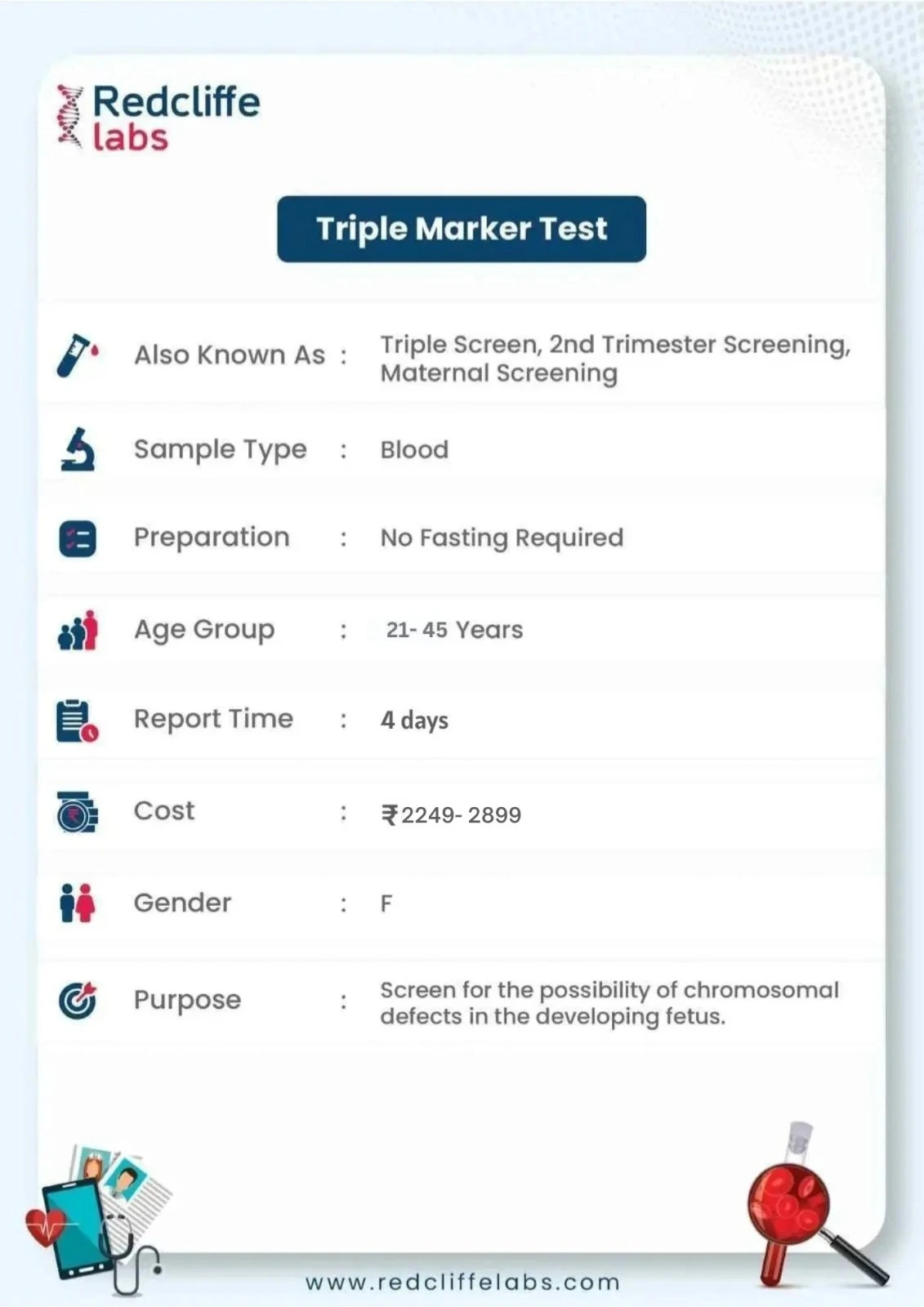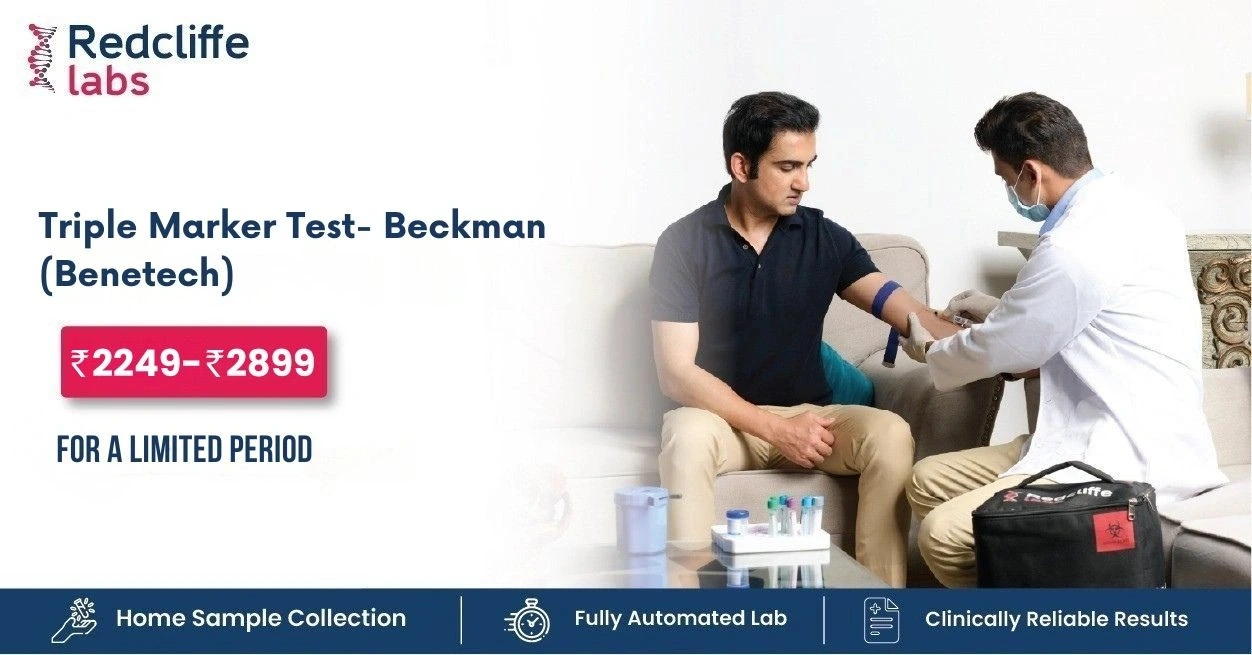Blood
Unlock special
discount on
this package
Login to Unlock 🔓
Also Known As
Triple Screen, 2nd Trimester Screening, Maternal Screeningtest Instructions
NABL Accredited lab*

Booking Benefits Unlocked Worth FREE 799

Report Consultation

Diet Plan
*Available once your report is generated.
At Redcliffe Labs, we have a single goal: to give India its right to quality diagnostics.
Customers served
Tests Processed Everyday
Cities
Collection Centres
World Class In-house Labs
Home Collection Experts
3 Test Parameters
Triple Marker
3 PARAMETERS INCLUDED
3 PARAMETERS INCLUDED
- AFP- Alpha Feto Protein Maternal Marker
- Beta HCG Total
- uE3- Estriol Unconjugated
Top Booked Health Checkup Packages
Reports in 12 hours
|Parameters 94
Reports in 12 hours
|Parameters 89
Reports in 12 hours
|Parameters 96
Reports in 12 hours
|Parameters 96
Reports in 12 hours
|Parameters 90
Helps you know your test better
Q. What Is A Triple Marker Test?
Q. What Happens During Triple Marker Screening?
Q. What Do The Triple Marker Test Indicate?
Q. What Are The Disorders That Can Be Screened With Triple Marker Test?
Q. Is There Any Risk To Baby During The Test?
Verified by Medical Expert

WRITTEN BY
Sheena Mehta

MEDICALLY REVIEWED BY
Dr. Pradeep Lodha
Table of Content
Introduction to Triple Marker Test
Becoming parents is a blessing but never easy, as it comes with several responsibilities. Throughout your pregnancy journey, your doctor may suggest different tests to monitor the baby's growth inside and ensure the safety of both the unborn baby and the mother-to-be. Each test suggested during pregnancy as a part of Prenatal screening is significant for monitoring pregnancy, detecting abnormalities (if any), and initiating preventive measures or treatment while there is still time. Among all the parental screening tests, a Triple Marker Test is mostly suggested to screen pregnant women for congenital disabilities. It helps assess the risk of fetal chromosomal abnormalities and genetic disorders.
Doctors often suggest a Triple Marker Test as a part of a Prenatal screening test between the 15th & 20th week of pregnancy. However, the time may vary, depending on the individual's circumstances. Redcliffe Labs is the name to recall if you are looking for a reliable diagnostic service provider for a Triple Marker Test in Pregnancy. With a wide network of labs and collection centers spread nationwide, we bring diagnostic care to every individual. So, worry not, and book your Triple Marker Test at home with us now.
Triple Marker Test Details In Brief:
| Also Known As | Triple Screen, 2nd Trimester Screening, Maternal Screening |
| Purpose | Screen for the possibility of chromosomal defects in the developing fetus. |
| Preparation | Do not take any over-the-counter medicine without confirming with your doctor |
| Fasting | No Fasting Required |
| Get Reports Within | 3 Days |
| Cost | INR 2499 |

What is the Triple Marker Test?
The triple marker test is used during pregnancy to detect the risks of fetal abnormalities. The test needs blood to check the health of both the fetus and mother. It involves various measures to detect three major substances in the mother's blood: alpha-fetoprotein (AFP), estriol, and human chorionic gonadotropin (hCG).
Your healthcare provider may conduct the test between 15 and 20 weeks of pregnancy. The result of the triple screen test helps them identify certain risks for genetic disorders or birth defects (neural tube defects and Down syndrome). The multiple marker test is not a definitive diagnostic test but provides information about developing or future risks during pregnancy.
What is the Purpose of the Triple Marker Test?
The Triple marker test's purpose is to detect abnormalities in the fetus. The test can layer out primary genetic causes, such as:
- Trisomy 13- Extra chromosome 13
- Neural tube defects- Abnormal development of the spinal cord or brain
- Down Syndrome- Extra copy of chromosome 21
- Edwards Syndrome- Extra chromosome 13
What Does the Triple Marker Test Use For?
The triple screen test is another name for the triple marker test. It is a screening test that helps assess the baby's condition and detects any defect or abnormality in the unborn baby. The test measures three substances in the mother's blood (AFP, hCG, and estriol). The test can also be used for:
- To detect abnormal levels that may lead to Down syndrome, neural tube defects, or chromosomal abnormalities.
- To determine the need for other diagnostic tests.
- To estimate the developing risks in the fetus.
What Does The Triple Marker Test Measure?
The triple marker test measures a certain risk linked with fetus abnormalities. Future complications, genetic or chromosomal defects, or risks in the likelihood of congenital disabilities are some factors that triple screen test evaluates. The multiple marker test can determine:
- Defect in neural tube
- Risks of Down syndrome
- Risk of trisomy 18 (Edward’s syndrome)
- If a woman is expecting twins
- If there is any abnormality in the baby.
What Does The Triple Marker Test Detect?
The triple marker test detects:
- Need for another diagnostic test
- High-risk pregnancy and delivery
- Medical care and intervention during pregnancy
- The emotional power of parents
Reasons You May Need A Triple Marker Test:
A healthcare practitioner often suggests a Triple Marker Blood Test to pregnant women as part of routine prenatal screening, especially with high-risk factors. Here are some of the circumstances your doctor may suggest Triple Marker Screening:
- Maternal Age: Pregnancy at 35 or older is more likely to cause complications and increases one's risk of having babies with Down Syndrome and other chromosomal abnormalities. The test helps assess their risk of developing such problems at the early stage possible.
- Previous Pregnancy Complications: Pregnant women with previous pregnancies with chromosomal abnormalities are always suggested to go for a Triple Test to monitor the current pregnancy while assessing the risks closely.
- Family History: You may need a Triple Screen Test if you have a history of giving birth to babies with genetic disorders or congenital disabilities to evaluate the current pregnancy and associated risks.
- Abnormal Ultrasound Findings: If your routine ultrasound or screening indicates some abnormalities that could be linked with chromosomal abnormalities, a Triple Screen Blood Test is often advised as a follow-up screening.
While there are multiple reasons a doctor may suggest a Triple Marker Test, also called 2nd Trimester Screening, it is not a definitive test and only a screening test. It can only indicate one's risk of having babies with chromosomal abnormalities. If the results are positive and show higher risks, your doctors may suggest additional tests to clarify and confirm the presence of any chromosomal or genetic disorders. Getting tested may give you better insight into your pregnancy and help you make informed decisions.
Conditions That Can Be Screened With A Triple Marker Test:
The primary objective of this Triple Test is to monitor pregnancy and assess the likelihood of the different conditions in the fetus, including:
- Down Syndrome: As a genetic disorder, Trisomy 21, also called Down Syndrome, occurs due to an extra chromosome 21, leading to distinct facial appearance, intellectual disabilities, & developmental delays. A triple screen test helps look for markers indicating the risk of babies with this problem.
- Edwards syndrome: Also called Trisomy 18, is another chromosomal defect causing developmental delays and leading to premature death. And A triple screening test helps assess fetal risk with Trisomy 18 or Edwards syndrome.
- Neural tube defects (NTDs): Moreover, a Triple Screening Testing screen for one's likelihood of developing congenital disabilities, which can lead to severe disabilities or other life-threatening conditions.
It is critical to understand none of the conditions mentioned above can be diagnosed with a Triple Marker Test; rather, it indicates the risk levels of these conditions.
Why Can a Doctor Suggest The Triple Marker Test?
A doctor may recommend the triple screen test to:
- Women above 35 years
- Women who already had a child with a birth defect
- Women who have a family history of disorders
- Women who conceived through IVF
- Women who have pre-existing health issues (diabetes and high blood pressure).
- Women who have taken certain prenatal medications with side effects
- Women who experience a prenatal viral infection
- Women who are exposed to high radiation
How is The Triple Marker Test different from the Double Marker Test?
Double marker and triple marker tests are both blood tests. A doctor may recommend the test to a woman during pregnancy to screen for genetic disorders or abnormalities in a fetus. A double marker screen is used for two substances (hCG and PAPP-A), while a triple marker measures three substances (AFP, hCG, and estriol). This is a major difference between the two. The triple screen test is an effective and accurate screening test. It helps rule out the risks of fetal abnormalities.
Triple Marker Tests List:
A Triple Marker Blood Test usually evaluates three major substances in the maternal blood to assess the risks of having a baby with chromosomal disabilities. Such substances are:
- Alpha-fetoprotein (AFP): Alpha-fetoprotein is a protein secreted by the developing fetus. If its levels are too much in your blood, it indicates a higher risk of neural tube defects or certain chromosomal abnormalities.
- Human chorionic gonadotropin (hCG): Another substance this blood test measures is hCG, a hormone produced by the placenta. Low hCG levels usually indicate potential pregnancy complications, like ectopic pregnancy or higher chances of miscarriage. On the contrary, elevated hCG levels indicate multiple or molar pregnancies.
- Estriol: Lastly, Estriol is an estrogen hormone that can be measured through this triple marker test, as its abnormal levels are usually associated with a higher risk of certain chromosomal disorders.
The test doesn't confirm any chromosomal abnormality or genetic disorder but indicates the risk of developing one. Your healthcare provider may suggest additional tests and other preventive measures depending on the test results.
Benefits Of A Triple Marker Screen Test:
- While monitoring pregnancy or the unborn baby's development, the test helps detect the risk of congenital disabilities in the early stage.
- Besides, the test helps assess the risks of other possible pregnancy complications early, making it easier to manage them better.
- Early diagnosing may help one make genetic counseling or other informed pregnancy-related decisions that benefit both the mother and baby.
Remember, a Triple Marker Screen Test is highly advisable to help you avoid several pregnancy-related complications.
Preparations Required For A Triple Marker Test:
Typically, no preparations are required for A Triple Screening Test. It is a non-invasive blood test that can be performed without fasting. However, some guidelines to be followed for accurate reports are:
- Generally, a Triple Marker Test is often suggested between the 15th to 20th week of pregnancy. However, the appropriate time for the test can vary, depending on the individual's circumstances. Therefore, it should be discussed before the test for better clarity.
- It is a simple test that requires no fasting. However, if you are on some medications or a special diet plan, share this with your doctor before the test. Also, follow their instructions on stopping or continuing to take them before the test.
- Relax and be comfortable; your anxiety or stress can influence your hormones or test results. If you have known allergies, fear of needles, or other queries, discuss them with the phlebotomists so that they can guide you better.
In general, no preparations are necessary. However, depending on your condition or any other factor, if special instructions are advised, follow them to avoid discrepancies in the test results.
Procedure Of A Triple Marker Test:
It is a non-invasive procedure that involves the following steps:
- A phlebotomist will tie a tourniquet (a band) on the upper arm during the process.
- Then they may ask you to make a fist so the vein can be found easily.
- Once the vein is found, they will disinfect the area using a disinfectant.
- Then, a needle will be inserted on the clean site to collect blood samples for processing.
- Once the sample is collected, the punctured site will be covered using a cotton ball, and the collected sample will then be transferred to the vial for sending to the laboratory.
- A phlebotomist will then put a bandage on the punctured site to prevent the infection.
The procedure is simple and safe and poses no risks to your pregnancy. However, during the blood drawing procedure, you may experience slight discomfort, pain, or a little bruise at the punctured site, which will be resolved soon. If you experience something unusual or the symptoms are not fading, seek medical assistance immediately.

Risks Associated with the Triple Marker Test
The triple marker test is a blood test. There are no or minor risks associated with the triple marker test. Insertion of a syringe may lead to:
- Hematoma
- Excessive blood loss
- Slight pain
- Itch
- Numbing or tingling sensation
- Brushes
- Weakness
- Fainting
- Nausea & vomiting
- Blood clot (in rare cases)
- Several punctures (to locate the vein)
Triple Marker Test Normal Range:
The approximate normal range for a Triple Marker Pregnancy Test is:
| Parameters | Normal Value |
| Alpha-fetoprotein (AFP) | 1.38 -187.00 IU/ml |
| Human chorionic gonadotropin (hCG) | 1.06 - 315 ng/ml |
| Estriol | 0.25 -28.5 nmol/l |
Your doctor can best help you understand the triple marker test results. The blood test measures three substances in a pregnant woman's blood: alpha-fetoprotein, estriol, and hCG.
Your results are normal if your range falls in the estimated range (above-listed). There is a low chance of fetal abnormalities. Let your doctor understand and describe your condition. They can guide you well with the values.
One of the common causes of abnormal triple marker test results is a delay in pregnancy date concerning the last menstrual period date.
This range may vary from lab to lab for several reasons, like technology or processing methods.
Triple Marker Test Result Interpretation:
The outcome will be positive or negative depending on the normal values of the Triple Marker Test. While positive test results indicate higher than average possibilities of having a baby with chromosomal abnormalities, negative test result exhibits very low or no risks of developing congenital disabilities in the fetus.
Remember, abnormal or positive triple marker test results don’t always indicate a birth defect. Similarly, negative triple-screen test results don’t always rule out pregnancy risks. Depending on the test results or other factors like medical history, age, and more, you may be advised to undergo additional tests for better clarity and a more accurate diagnosis.
How Accurate Are The Triple Marker Test Results?
The accuracy of the triple marker test is 60 to 70%. Doctors suggest that the test acts as a screening tool for detecting and diagnosing abnormalities in a fetus; however, it is not accurate. It may produce positive, negative, or false test results.
The test does evaluate the substances in a mother's blood. Nonetheless, you should consider further testing to confirm the risks or potential abnormalities. You may opt for:
- Quad Screen
- AFP Screening
- Nuchal Translucency
- Fetal Anatomy Scan
- Amniocentesis
- CVS
Factors affecting the triple marker test results
The triple marker test evaluates the risks of abnormality in the fetus. Some factors might affect the test results:
- Age of pregnant women
- Quality of egg and sperm (based on ethnicity)
- Diet
- Socio-economic factors
- Cultural factors
- Differences in lifestyle and environment
- Availability of fertility treatment
- Medical care and reproductive outcomes
- Body weight of pregnant women
Triple Marker Test Price @ Redcliffe Labs!
We create all our health tests and packages, keeping customers' different needs and budgets. Therefore, you can book different tests with us at highly competitive rates. With Redcliffe Labs, Triple Marker Test Price is just Rs 2499. You can book the test to get screened from the comfort of your home. So, what are you waiting for? We also provide Express Slots, which help you get your sample picked within 45 minutes. Book now!

Note: We also offer Triple Marker Test PAN India. Please call the number 8988988787 to check the availability of our services in your area.
Pregnancy-Related Tests/Packages That You Can Book with Redcliffe Labs
| Tests/Packages | Offer Price in INR |
| HCG Test | ₹499 |
| HCG Tumor Marker (Cancer) Test | ₹699 |
| Alpha Fetoprotein (AFP), Maternal Marker Test | ₹1000 |
| Double Marker Test- Auto-Delfia | ₹2600 |
| Double Marker Test | ₹2249 - ₹2899 |
| Double Marker Test + PLGF- Roche | ₹3300 |
| Quadruple Marker Test | ₹2999 - ₹3600 |
So, Don’t Put Your Baby’s Health On Guess. Take A Triple Marker Test!
As part of your prenatal screening, a triple marker pregnancy test is highly advisable to detect and manage the problem while there is still time. Redcliffe Labs is your trusted diagnostic partner from where you can book a Triple Marker Test at home. We are committed to precision and provide accurate test results within a stipulated timeframe. So, delay no more and get yourself tested in time.
5 Simple Steps to Manage Your Health with Redcliffe Labs
Quick, Simple & Convenient; trusted care delivered to your doorstep.

Start Your Online Booking
Open the Redcliffe Labs website/app. Select the test or package and enter your details. Schedule the service for your preferred slot.

Live Tracking
Stay updated with real-time tracking for a smooth and timely home sample collection.

Sample Collection
Our certified experts ensure a smooth, hygienic, and fully compliant sample collection experience.

Doctor-Verified Smart Reports
Every report is clinically checked by expert doctors and shared with smart, actionable insights.

Your Health Journey Continues Post Reports
Consult with our expert medical team to get actionable insights to improve your health.
Nearby Labs(9)
Redcliffe Labs Noida

MC-5280
Redcliffe Collection Center
Redcliffe Collection Center
Redcliffe Collection Center
Redcliffe Collection Center
Redcliffe Collection Center
Redcliffe Collection Center
Redcliffe Collection Center
Redcliffe Collection Center
Frequently Asked Questions
What is the Triple Marker Test?
What is the Triple Marker Test during pregnancy?
Is the Triple Marker Test necessary after the Double Marker Test?
What is the cost of a Triple Marker Test?
When is the Triple Marker Test done?
Is the Triple Marker Test mandatory?
How accurate is the Triple Marker Test?
How is the Triple Marker Test done?
Why is the Triple Marker Test done?
Can I book a Triple Marker Test- Beckman (Benetech) near me?
Can I book a home collection for a Triple Marker Test- Beckman (Benetech)?
Health Articles & Blogs
My Health
Stay informed with our expert health articles and blogs. Explore comprehensive guides on diseases, nutrition, preventive care, and wellness tips to help you make better health decisions.
Why is PCOS Continuously Rising in Women?

10 Healthy Holi Recipes for Your Fitness Goals in 2026
Looking for healthy Holi recipes? Discover 10 festive dishes that support your fitness goals while keeping celebrations delicious.

Importance of Heart Health Before Pregnancy: Everything You Need to Know

Migraine Treatment at Home: Effective Ways to Relieve Migraines Naturally

High SGPT and SGOT Levels: Causes, Symptoms, Normal Range & When to Worry

Brain Hemorrhage Symptoms: Early Warning Signs, Types, Causes & When to Seek Emergency Care

What is SGPT in Blood Reports? Everything You Need to Know

Capsicum (Shimla Mirch) 101: Benefits, Nutritional Value, Uses and More
Explore My Health
